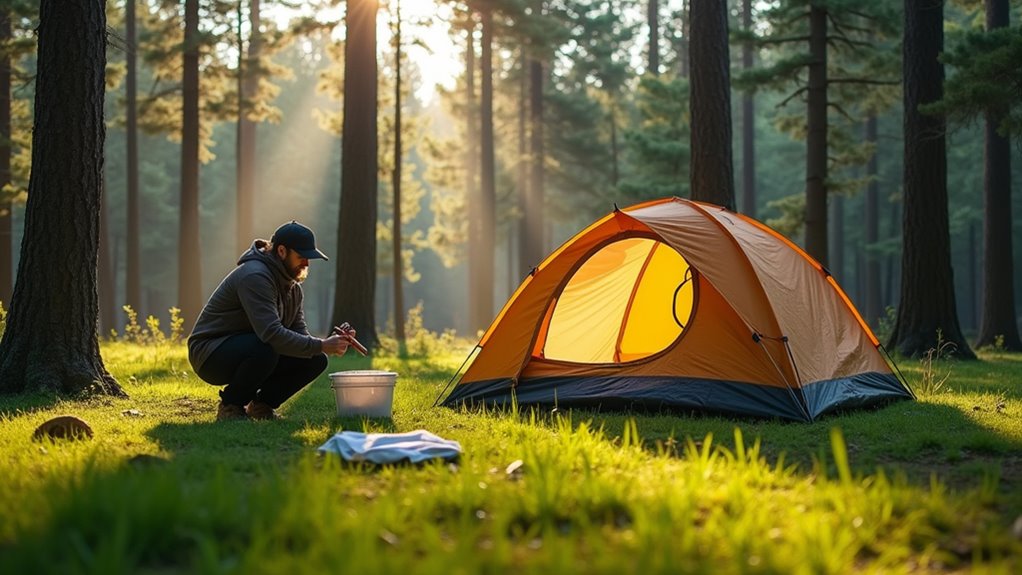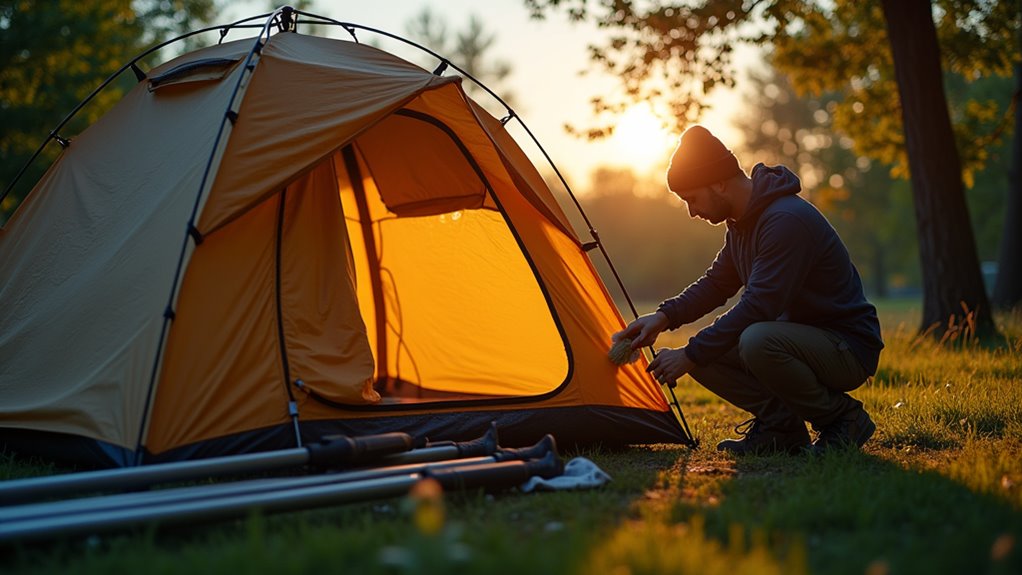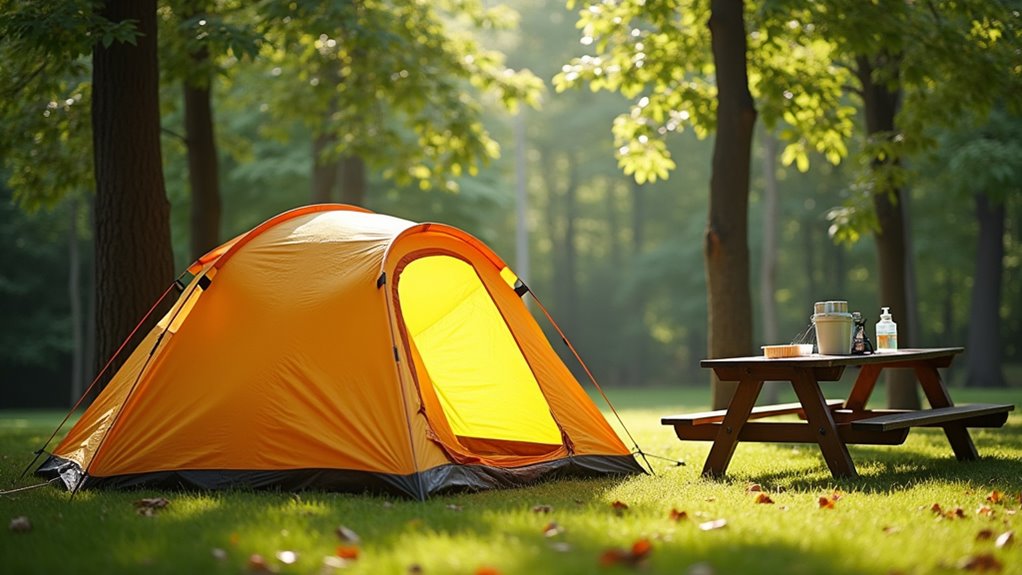How To Clean A Tent After Camping
This post contains affiliate links. As an Amazon Associate, we earn from qualifying purchases.
To clean your tent after camping, first set it up fully to inspect and remove any debris from seams and zippers. Then, hand wash the tent in a bathtub using cold water and a specialized tent cleaner, followed by a thorough rinse to remove all soap residue. Afterward, wipe down the tent poles and clean the zippers with a toothbrush before applying a silicone lubricant. Finally, dry the tent in sunlight and a breezy area to prevent mold growth. Additional steps and tips for proper tent care are provided later for those interested in extending the life of their tent.
Essential Facts in 30 Seconds
- Set up the tent to check for damage and remove all debris.
- Hand wash the tent with mild soap and cold water; avoid machine washing.
- Clean poles with a soft cloth and remove dirt from zippers using a toothbrush; lubricate zippers.
- Fully dry the tent in sunlight and air it out to prevent mold.
- Inspect and repair seams and zippers before storing the tent with moisture absorbers.
Preparing for Tent Cleaning

Prepare well before cleaning your tent to get the best results. First, set up your tent fully. Check all seams, floors, and zippers carefully. Look for stains, damage, or dirt inside and outside the tent. Remove pine needles, mud, or other debris.
Next, get your cleaning supplies ready. Use cool or lukewarm water with mild, fragrance-free dish soap or a special tent cleaner. Avoid strong detergents that can damage the waterproof coating. Use soft tools like sponges and microfiber cloths. It’s important to gather cleaning supplies like a soft-bristled brush for scrubbing affected areas.
Have a bathtub or big container for soaking the tent. Keep mineral oil or alcohol-based hand sanitizer nearby to remove sticky pine sap. Bring a toothbrush for scrubbing small spots and zipper lubricant to keep zippers working smoothly. Additionally, ensure you have gentle soap or specialized tent cleaner on hand for effective cleaning.
Good preparation helps clean your tent well and keeps it in great shape.
Washing Process
Prepare your tent carefully before cleaning. Hand wash your tent in a bathtub or large tub. Machine washing can harm the fabric and waterproof layers. Use cold or lukewarm water to keep the fabric strong. Turn the tent inside out and unzip all doors. This helps clean every part well. Make sure to remove loose debris before the washing process to prevent grinding dirt into the fabric.
Pick a special cleaner made for tents, like Atsko® Sport-Wash or Nikwax. Follow the instructions on the label closely. Don’t soak the tent longer than recommended. For dirty spots, use mild dish soap on tough stains first. Use rubbing alcohol to remove sticky sap. Rinse the tent well with clean water to wash away soap and dirt.
Dry the tent outside but keep it in the shade. Direct sunlight can damage the waterproof coating. Make sure to rinse the tent thoroughly to remove any soap residue, which helps prevent mildew.
Clean your tent often to keep it working well and last longer. Regular care helps protect your tent’s fabric and waterproofing.
Cleaning Tent Poles and Zippers

Clean tent poles and zippers to keep them working well longer. Use a soft cloth to wipe dirt from the poles. Pay close attention to the joints where dirt can cause scratches. Rinse poles with fresh water after saltwater exposure. Dry them fully to avoid rust. Spray a little silicone on the joints to stop rust and help poles slide smoothly.
Next, clean the zippers. Use a soft toothbrush to remove dirt and sand from the zipper teeth. Rinse with clean water if the dirt sticks. Don’t force stuck zippers. Move the slider gently after cleaning. Use silicone spray or wax on zippers to keep them moving easily. Regular maintenance can prevent zipper issues during trips, including stuck zippers that can lead to frustration.
Check poles and zippers often for damage. Fix small problems early for safe and fun camping trips.
Drying the Tent
Drying your tent well keeps it strong and ready for use. Wet tents grow mold and mildew, which ruins fabric and zippers. Proper drying ensures extended lifespan of your tent.
Shake the tent to remove water drops. Use a towel to wipe wet spots. Place the tent in sunlight to speed up drying. Sun’s heat dries tents fast and kills germs.
Set the tent in a windy spot. Open tent doors to let air flow inside. Keep the tent standing outside until fully dry.
Check every corner for damp patches. Move those spots into the sun or wind. Drying your tent is essential to prevent mold and mildew growth and helps it last longer, ensuring it stays fresh for your next trip.
Post-Cleaning Care

Proper care after cleaning your tent helps it last longer and work better. Start by checking seams and zippers for damage. Small tears or loose threads can cause leaks. Fix them quickly to keep water out. Regularly cleaning your tent with vinegar and water solution can also help prevent mold growth.
Use a silicone-based lubricant on zippers. Avoid greasy oils that can damage them. Clean zippers gently with a soft brush to remove dirt.
Store the tent only when it’s completely dry. Wet tents can grow mold and mildew. Put silica packets in the storage bag to keep moisture low. Treat any mildew with special enzyme cleaners made for tents. Follow the product instructions for best results. Regularly check your tent for mold during long storage periods to prevent future issues.
Fold or roll the tent loosely. Use a bag that lets air pass through. Keep the tent in a cool, dry spot away from sunlight. Air your tent regularly during off-season storage. This stops bad smells and keeps it fresh for your next trip.
Frequently Asked Questions
Can I Use Bleach to Clean My Tent?
Bleach harms your tent’s fabric and weakens the seams. It causes colors to fade and materials to break down. Use a cleaner made for tents instead. These cleaners keep your tent strong and clean. A soft brush or cloth works best to scrub gently. Avoid harsh chemicals to protect your gear. Your tent will last longer and stay waterproof with the right care.
How Often Should I Clean My Tent?
Clean your tent at least once every season. Light cleaning after each trip keeps it fresh. Dirt and bad smells mean you need to clean it more often. Check for stains, mud, or bugs before storing. Use mild soap and water for cleaning. Dry it fully to stop mold and mildew. Regular care helps your tent last longer and stay safe.
What Should I Do if My Tent Smells?
A smelly tent needs quick care. Soak it in warm, soapy water for a few hours. Enzymatic cleaners work well to stop mildew and remove bad smells. Let the tent dry fully in fresh air. This stops new odors and keeps the tent fresh for your next trip. Clean tents last longer and feel better inside. Don’t forget to store your tent dry and cool after each use. This simple care makes your tent smell nice every time.
Can I Machine Wash My Tent if It’s Heavily Soiled?
Machine washing a heavily soiled tent can damage its fabric and coatings. Gentle hand washing works best to clean dirt and stains without harming the material. Use mild soap and lukewarm water to protect waterproof layers. Avoid harsh scrubbing that can wear out the fabric. This careful cleaning helps your tent stay strong and last longer. Treat your tent like delicate gear—it needs soft care to perform well on every trip.
Is It Safe to Use Vinegar for Cleaning?
Vinegar works well for cleaning and kills mold effectively. It is a natural and safe cleaner for many surfaces. Avoid using vinegar on canvas tents, as it can harm the fabric. Test the tent fabric first before cleaning. Use gentle cleaners made for tents to keep them strong. Vinegar saves money and helps the environment too. Use it wisely to protect your gear.
Conclusion
Follow these simple steps to keep your tent in top shape. Clean your tent after every trip to protect it and extend its life. Use a mild soap like Nikwax Tent & Gear Solar Wash. This soap removes dirt without harming the fabric. Rinse the tent well with clean water to remove all soap. Dry the tent completely before storing it to prevent mold and smells. Store the tent in a cool, dry place. Doing this keeps your tent ready for your next outdoor adventure. Clean tents last longer and keep you safe in bad weather. Take care of your tent, and it will take care of you.
